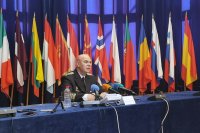The Ministry of Justice publishes for public consultation changes to the Rules of Registration

The Ministry of Justice has published proposed amendments to the Regulation on Registration for public consultation. These changes aim to restrict access to property ownership documents, in an effort to curb real estate fraud. Under the new rules, unauthorised individuals will no longer be able to obtain uncertified copies or extracts from property registration records.
Who can obtain a copy of a deed at present?
At present, virtually anyone can request and obtain a copy of the ownership deed for any property. The current legal framework allows access to highly sensitive information — including, in some cases, the bank accounts used in property transactions. It's important to note that this doesn’t apply only to notarial deeds, but also to ownership deeds issued prior to 1990, when properties acquired from the state or municipality did not require a notarial deed.
These pre-1990 documents are currently a major vulnerability. Property fraud rings gain access to them, forge the documents with ease, and file fake ownership claims with the Cadastre, effectively stealing real estate.

Georgi Georgiev, Minister of Justice: "We have dozens of such cases, recently we have noticed a trend as a result of the accelerated work of the state, dozens of cases of abuse, because fraudsters use ownership deeds or notarial deeds — sometimes dating back decades — as templates. With old typewriters, they reproduce the text and create completely forged documents that appear genuine.”
How will this possibility be limited, what is proposed to be changed?
The proposed changes significantly limit access to copies of notarial and ownership deeds. If adopted, only a narrow group of authorised professionals will be permitted to request these documents, and they will need to provide a justified reason for doing so.

Georgi Georgiev, Minister of Justice:
“Access will be limited to notaries, lawyers, bailiffs, relevant government authorities, and of course, the property owners themselves.
Say you want to sell your apartment in Burgas. I would need to conduct a due diligence check. You, as the owner, would request all the necessary documents from the Registry Agency. You have the legal right and legitimate interest to do so.
But what interest does an unrelated operator have in gaining full access and photocopies — or as they’re officially called, ‘transcripts’ — of your notarial deed? This is precisely the loophole we’re closing. Those who are professionally entitled to access will retain their rights. If you wish to use a lawyer, they’ll still have full access.”
photo by BTA/archive
How does this limit opportunities for fraud?
Without access to copies of original documents, it becomes significantly harder for fraudsters to create forgeries and execute real estate scams. Additionally, the system will now track who has requested copies of ownership documents. In the event of fraud, investigators will have a clear trail showing who accessed the materials — a crucial lead for criminal investigations.
When will these changes come into force?
Once the public consultation period ends, the proposed amendments will require approval through a government decree. During the consultation, feedback from various professional communities will be considered — and, as the Minister suggests, those who oppose the changes may reveal their underlying motives.
“We’ll see who truly stands behind transparency and who benefits from the current lack of control,” Georgiev concluded.

photo by BGNES/archive
 Economy Minister Orders On-Site Checks at Electricity Suppliers Following Surge in Complaints
Economy Minister Orders On-Site Checks at Electricity Suppliers Following Surge in Complaints
 Sunken Fishing Vessel off Sozopol Shows No Breaches or Holes in the Hull, Navy Chief Says
Sunken Fishing Vessel off Sozopol Shows No Breaches or Holes in the Hull, Navy Chief Says
 ВСС препрати на Прокурорската колегия въпроса с изпълняващия функциите главен прокурор
ВСС препрати на Прокурорската колегия въпроса с изпълняващия функциите главен прокурор
 Депутатите отложиха въвеждането на мултифондовете в пенсионната система
Депутатите отложиха въвеждането на мултифондовете в пенсионната система